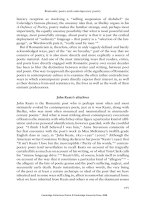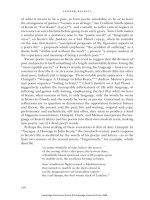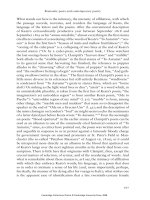The cambridge companion to british roman 28
Bạn đang xem bản rút gọn của tài liệu. Xem và tải ngay bản đầy đủ của tài liệu tại đây (38.58 KB, 1 trang )
ja m e s c h a n d l e r a n d m au r e e n n . m c l a n e
This is Wordsworth in what might be described as a quintessentially Romantic moment, catching himself in the act of wishing himself out of enlightenment, into re-enchantment, but just by virtue of having to wish it so, he
acknowledges that the customary creed of the ancients cannot simply be put
on again as if nothing had happened since. The creed is acknowledged as
“outworn.” But how interesting that he frames his wish to reinhabit this
creed in terms of alternative siblings. These are two of the sons of Poseidon,
god of the sea that, in this poem, seems to the poet standing on the lea to
“bare . . . her bosom to the moon.” Proteus, or “first born,” is Poseidon’s
eldest son, but he is illegitimate. Triton is Poseidon’s only legitimate son. Proteus responds to the world by assuming innumerable forms, thus remaining
elusive to capture. He is the principle of poetry that Keats enshrined in the
idea of the “camelion poet,” the artist who enacts in his person the mimesis
by which his art is constituted. Triton, by contrast, plays the world on his
famous instrument.
The two sons of Poseidon suggest the double-sidedness of poiesis, a duality
the Romantics compulsively explored. Able to inhabit any form, Proteus, we
might say, embodies Shelley’s polemically elastic conception of poetry as any
great imaginative achievement, any triumph of poiesis as making (see his
invocation of Plato’s philosophy, the Roman Senate, the doctrines of Jesus,
Bacon’s science, and Dante’s Commedia, all “poetry” in his 1821 Defence);
whereas Triton, committed to his one powerful instrument, figures what
Shelley called (in that same essay) “poetry in a more restricted sense,” that
is, metrical language.5
Poetry, in other words, retains its central role in the Romantic era because,
in that age as perhaps in no other before or since, poetry came to mean (potentially) many different things and because it established itself in relation to
so many different things. Poetry As (for example) Knowledge, Imagination,
Truth, the Esemplastic Power; Poetry And (for example) Science, Philosophy,
Religion, The Novel, Politics. The essays in this volume explore what we are
provisionally calling the “Protean” and the “Tritonian” aspects of poetry.
Many essays here follow the Romantics themselves by troubling the border
between “poetry as” and “poetry and.” Our contributors situate Romantic poetry in various matrices, contexts, and relations: viz. Nick Groom’s
exploration of poetry and antiquity; Susan Stewart on poetry and meter and
form; Andrew Elfenbein on poetry and the standardization of English; Ann
Rowland on poetry and the novel; Adriana Craciun on poetry and gender
and sexuality; Tim Fulford on poetry and empire; Kevis Goodman on poetry
and the science of nostalgia. Contributors also offer inquiries into poetry as
a transformative and transformable power: poetry as a pantheon, in Jeffrey
Cox’s essay; as cognition, in Simon Jarvis’s; as lyric inquiry into progress, in
6
Cambridge Collections Online © Cambridge University Press, 2008









